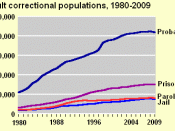Prison and the Alternatives: Is Incarceration the Answer to Crime?
How well do our prisons reform prisoners? What are the alternatives to prison? What is the best, most cost-effective way of protecting the public? These are some of the questions raised by individuals who are legitimately concerned not only with where their tax dollars are going, but also with what is being done to break the cycle of crime within their representative communities. When prisons were first introduced to our society in 1790, the idea of rehabilitation as an alternative to corporal or spiritual punishment was adopted and the belief that if inmates were forced to examine their conduct in confinement, repentance and religious conversion could occur. David Cayley, a reporter for the CBS show Ideas, summarizes the reasons we jail people today:
In theory, we send people to prison for two reasons: first, to teach them to behave peaceably in society; secondly, to keep criminals out of sight and mind.
The justice system has moved closer to the second purpose. A difficulty with sending most of those that commit offenses to prison is that it intensifies problems over the long-term because prison "dehabilitates" inmates (qtd. in Lawrence 8).
As a society, we expect these bleak, brutal facilities to correct our criminals. In fact, prisons are more likely of doing the opposite. In the words of the United Kingdom's Home Secretary, Douglas Hurd, "Prisons are an expensive way of making bad people worse" (qtd. in Anderson 5). Late 1997 statistics show rates of recidivism of 60% or more for released prisoners (Lawrence10). This statistic clearly proves that incarcerating offenders is an ineffective method of solving today's crime problems. David Cayley comments, "Rates of recidivism everywhere testify to the fact that those who go to prison will often go more than...

![[Portrait of Juan Tizol(?) and Lawrence Brown(?), Aquarium, New York, N.Y., ca. Nov. 1946] (LOC)](https://s.writework.com/uploads/7/77189/portrait-juan-tizol-and-lawrence-brown-aquarium-new-york-n-thumb.jpg)
